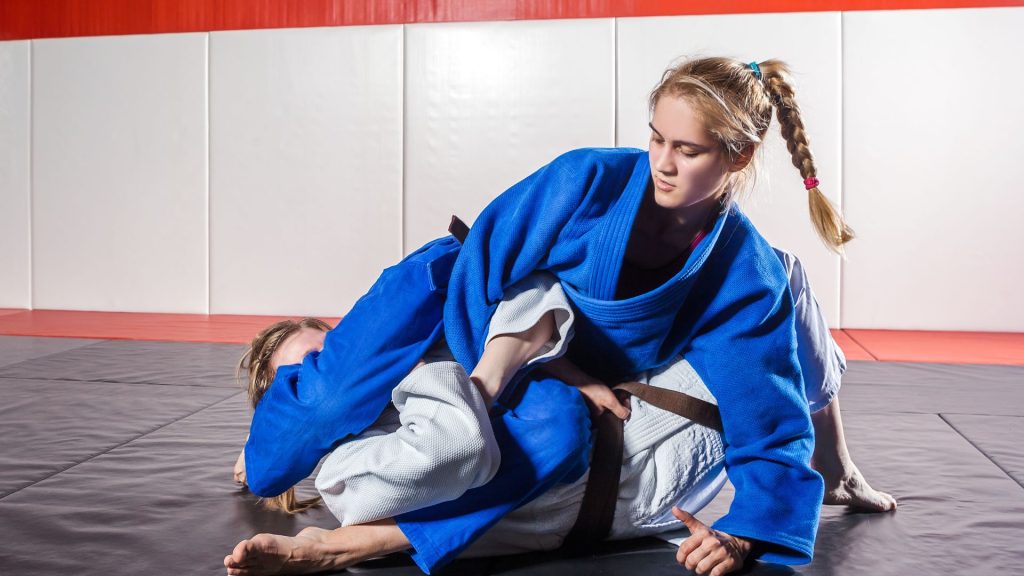Jiu-Jitsu, a martial art that originated in Japan and gained immense popularity in Brazil, has transcended its traditional role as a self-defense technique to become a powerful tool for empowering women and enhancing their physical and mental well-being. The art’s focus on leverage and technique, rather than brute strength, creates an environment where women can excel, building confidence and fostering a sense of empowerment. Physically, Jiu-Jitsu offers a comprehensive workout that engages various muscle groups, promoting strength, flexibility, and cardiovascular health. Women who practice Jiu-Jitsu often experience improved physical fitness, which can lead to increased self-esteem and body confidence. Unlike many traditional exercise routines, Jiu-Jitsu provides both aerobic and anaerobic benefits, helping practitioners develop endurance and build lean muscle mass. The full-body nature of the practice contributes to weight management and overall wellness. One of the most transformative aspects of Jiu-Jitsu for women is the shift in mindset it encourages.
 The art teaches individuals to think strategically, analyze situations, and make quick decisions – all skills that translate into everyday life. Through consistent practice, women develop mental resilience, learning to manage stress, stay composed under pressure, and overcome challenges. These skills are particularly empowering, as they contribute to a heightened sense of personal security and self-efficacy. Furthermore, the supportive community within Jiu-Jitsu academies plays a crucial role in enhancing women’s well-being. Training partners and instructors often create a safe and inclusive atmosphere, fostering a sense of belonging and camaraderie. As women connect with like-minded individuals who share their passion for atos jiu jitsu, they build strong social networks that provide emotional support and encouragement. These relationships extend beyond the dojo, offering a valuable support system that positively impacts mental health. Jiu-Jitsu’s effectiveness as a self-defense method also bolsters women’s confidence. By learning techniques that leverage an opponent’s size and strength, women gain the skills to protect themselves in real-world scenarios.
The art teaches individuals to think strategically, analyze situations, and make quick decisions – all skills that translate into everyday life. Through consistent practice, women develop mental resilience, learning to manage stress, stay composed under pressure, and overcome challenges. These skills are particularly empowering, as they contribute to a heightened sense of personal security and self-efficacy. Furthermore, the supportive community within Jiu-Jitsu academies plays a crucial role in enhancing women’s well-being. Training partners and instructors often create a safe and inclusive atmosphere, fostering a sense of belonging and camaraderie. As women connect with like-minded individuals who share their passion for atos jiu jitsu, they build strong social networks that provide emotional support and encouragement. These relationships extend beyond the dojo, offering a valuable support system that positively impacts mental health. Jiu-Jitsu’s effectiveness as a self-defense method also bolsters women’s confidence. By learning techniques that leverage an opponent’s size and strength, women gain the skills to protect themselves in real-world scenarios.
This newfound confidence transcends physical abilities, permeating various aspects of life. Women who practice Jiu-Jitsu often report feeling more empowered, assertive, and capable of setting and achieving goals. This holistic empowerment journey is at the core of Jiu-Jitsu’s impact on women’s well-being. Importantly, Jiu-Jitsu provides a platform for women to challenge societal stereotypes and break down gender barriers. As they enter what was traditionally considered a male-dominated space, women redefine their roles and capabilities. This reshaping of perceptions extends beyond the dojo, inspiring women to pursue unconventional paths and occupations, emboldened by the confidence they’ve gained through Jiu-Jitsu. The art’s emphasis on technique, mental agility, and community support fosters a transformative experience that goes beyond physical fitness. Women who practice Jiu-Jitsu develop not only strength and endurance but also a resilient mindset that empowers them in all aspects of life. As this martial art continues to gain recognition for its positive impact, more women are finding empowerment, camaraderie, and personal growth on the mats.
